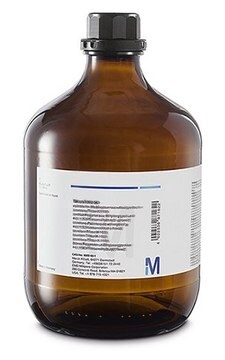W278430
Nonanoic acid
natural, 98%, FG
Sinónimos:
Acid C9, Pelargonic acid
About This Item
Productos recomendados
origen biológico
Olea europaea
Nivel de calidad
grado
FG
Fragrance grade
Halal
Kosher
natural
Agency
follows IFRA guidelines
meets purity specifications of JECFA
cumplimiento norm.
EU Regulation 1223/2009
EU Regulation 1334/2008 & 178/2002
FDA 21 CFR 173.315
FDA 21 CFR 178.1010
densidad de vapor
5.5 (vs air)
presión de vapor
<0.1 mmHg ( 20 °C)
Ensayo
98%
lim. expl.
9 %
índice de refracción
n20/D 1.432 (lit.)
bp
268-269 °C (lit.)
mp
9 °C (lit.)
densidad
0.906 g/mL at 25 °C (lit.)
aplicaciones
flavors and fragrances
Documentación
see Safety & Documentation for available documents
alérgeno alimentario
no known allergens
alérgeno de la fragancia
no known allergens
Organoléptico
cheesy; waxy; tallow
cadena SMILES
CCCCCCCCC(O)=O
InChI
1S/C9H18O2/c1-2-3-4-5-6-7-8-9(10)11/h2-8H2,1H3,(H,10,11)
Clave InChI
FBUKVWPVBMHYJY-UHFFFAOYSA-N
¿Está buscando productos similares? Visita Guía de comparación de productos
Categorías relacionadas
Palabra de señalización
Warning
Frases de peligro
Consejos de prudencia
Clasificaciones de peligro
Eye Irrit. 2 - Skin Irrit. 2
Código de clase de almacenamiento
10 - Combustible liquids
Clase de riesgo para el agua (WGK)
WGK 1
Punto de inflamabilidad (°F)
278.6 °F - Pensky-Martens closed cup
Punto de inflamabilidad (°C)
137 °C - Pensky-Martens closed cup
Elija entre una de las versiones más recientes:
¿Ya tiene este producto?
Encuentre la documentación para los productos que ha comprado recientemente en la Biblioteca de documentos.
Los clientes también vieron
Global Trade Item Number
| Número de referencia del producto (SKU) | GTIN |
|---|---|
| W278430-1KG-K | 4061838093462 |
| W278430-500G-K | 4061834404866 |
| W278430-5KG-K | 4061834396994 |
| W278430-SAMPLE-K | 4061837516719 |
Nuestro equipo de científicos tiene experiencia en todas las áreas de investigación: Ciencias de la vida, Ciencia de los materiales, Síntesis química, Cromatografía, Analítica y muchas otras.
Póngase en contacto con el Servicio técnico







